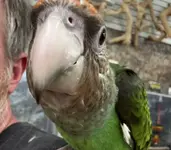I have seen and read through lots of posts like this. A lifelong dog person, I fell in love with birds months ago when my kids brought home a group of young chickens from their camp to watch over the weekend so we could continue socializing them. Turns out these were gateway chickens. I literally had no idea how smart and unique these creatures could be. I've been spending a ridiculous amount of time now at local shops and communicating with rescues trying to find the right bird
I think a cape (brown necked) parrot might be right for me but outside one YouTuber it seems like nobody has talked about these gentle sweet birds in about a decade. Are they just that rare? Is everyone with them too busy enjoying their lives with their perfect angels?
I’ve heard they are gentle and never bite or they are super head strong and only a professional parrot wrangler should dare bringing one home. I’ve heard they talk better than African grays but have literally never heard one speak online or elsewhere. I am looking at one young cape who is delightful and easy going but I know very little about who they might be when they become an adult. Are they territorial, do they go from an everyone loving happy kiddo to a one person terror?
Anyway when I compare taking this girl home to say a spicy little Hahns lunatic the biggest fear I have is this lack of real info beyond a very old post here, a couple of brief YouTubes and mythology that tells me she’ll either be the most perfect angel baby ever or quite possibly burn our house to the ground. Help from any happy or resigned owners would be very appreciated.
I’ve visited this individual probably close to a dozen times now, I admit that I’m being slow in the lifetime commitment I’ll be making.
I think a cape (brown necked) parrot might be right for me but outside one YouTuber it seems like nobody has talked about these gentle sweet birds in about a decade. Are they just that rare? Is everyone with them too busy enjoying their lives with their perfect angels?
I’ve heard they are gentle and never bite or they are super head strong and only a professional parrot wrangler should dare bringing one home. I’ve heard they talk better than African grays but have literally never heard one speak online or elsewhere. I am looking at one young cape who is delightful and easy going but I know very little about who they might be when they become an adult. Are they territorial, do they go from an everyone loving happy kiddo to a one person terror?
Anyway when I compare taking this girl home to say a spicy little Hahns lunatic the biggest fear I have is this lack of real info beyond a very old post here, a couple of brief YouTubes and mythology that tells me she’ll either be the most perfect angel baby ever or quite possibly burn our house to the ground. Help from any happy or resigned owners would be very appreciated.
I’ve visited this individual probably close to a dozen times now, I admit that I’m being slow in the lifetime commitment I’ll be making.

